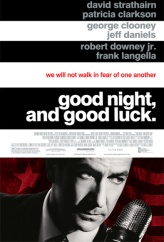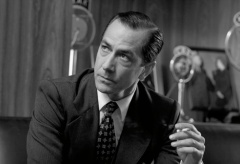Good Night, and Good Luck. |
| |
 |
USA, 2005. Rated PG. 90 minutes.
Cast:
David Strathairn, George Clooney, Robert Downey Jr, Patricia Clarkson, Ray Wise, Frank Langella, Jeff Daniels, Tate Donovan, Tom McCarthy, Matt Ross, Reed Diamond, Robert John Burke, Grant Heslov
Writers: George Clooney, Grant Heslov
Original Music: Jim Papoulis
Cinematography: Robert Elswit
Producer: Grant Heslov
Director: George Clooney
LINKS
USA, 2005. Rated PG. 90 minutes. |
 ove over Michael Moore. The most unabashedly political film of the year this year must surely be Good Night, and Good Luck.
ove over Michael Moore. The most unabashedly political film of the year this year must surely be Good Night, and Good Luck.
Fear not. Good Night, and Good Luck is also a spellbinding, creatively filmed re-enactment of the clash between broadcast journalist Edward R. Murrow (David Strathairn) and Senator Eugene McCarthy, whose anti-communist witch hunts ruined many a career and created a pervasive culture of paranoia in the United States in the early 1950s.
Shot in black and white, Good Night, and Good Luck actually opens on October 25, 1958, with Murrow receiving an award from the Radio Television News Directors Association. His acceptance speech is not all warm and fuzzies, though. He criticizes society's allergy to disturbing information, and he decries the use of television to distract, delude, amuse, and insulate. Murrow may not mention any shouting pundits or crappy reality shows by name, but it's a lecture aimed squarely at us, the modern audience.
Good Night, and Good Luck is director and co-writer George Clooney's effort to show how television can instead be a powerful tool against ignorance, intolerance and indifference. It certainly was in the hands of Murrow, the anchor of CBS's popular news documentary show “See It Now.”
Flashback to 1953. Most of the country is loathe to speak out against Senator McCarthy's methods for fear of being targeted and blacklisted. McCarthy's influence has become so strong that Murrow and his colleagues can't keep their jobs without signing a loyalty oath disavowing communism.

Edward R. Murrow (David Strathairn) prepares to deliver an editorial in Good Night, and Good Luck. |
It all begins with a small event. The Navy kicks out a sailor named Milo Radulovich for being an alleged security risk. (Apparently he was caught with one of his father's Serbian newspapers.) Over the opposition of CBS executive Sig Mickelson (Jeff Daniels), Murrow and his producer Fred Friendly (Clooney) decide to air an investigative report on Radulovich, questioning the lack of due process. Soon this involves them in an escalating war of words with McCarthy himself. McCarthy goes after Murrow for being a communist sympathizer, and targets members of his staff, particularly poor Don Hollenbeck (Ray Wise). Murrow doesn't shy away from the fight, attacking McCarthy's fear tactics and the erosion of personal liberties. “We cannot defend freedom abroad while deserting it at home,” he asserts. By now, whether Murrow's editorials speak to the present day is beside the point. As Murrow keeps going after Goliath, the atmosphere at CBS becomes so tense that you can't wait to find out what happens next.
If you look at the film's credits, you'll notice no actor plays McCarthy. That's because, in one of his cleverest ideas, Clooney uses archival footage of McCarthy himself. Not only can't Clooney be accused of distorting history, but the well integrated technique lends to the film a documentary reality that makes it all the more authoritative and engrossing. And the inclusion of archival footage with Liberace—with whom Murrow is forced to do a fluffy interview as a tradeoff for his McCarthy attacks—is inspired. It seems Liberace just hasn't found the right girl yet.
None of this would work without Stathairn. Though unheralded, Strathairn has long been an exemplary character actor. Most people will recognize him from supporting roles in films like The Firm, LA Confidential, and Dolores Claiborne, or a brief recurring part on HBO's “The Sopranos” (as the guidance counselor Carmela has an affair with). In this, his most prominent lead role to date, Strathairn is riveting. Though he sits motionless during Murrow's monologues, Strathairn's commanding delivery, his steady gaze, and his brazen pose (lit cigarette held high, on camera) claim every ounce of your attention. It takes quite an actor to pull that off.
There's no shadow of doubt why Clooney made Good Night, and Good Luck. There's no shadow of doubt that he intends the film to speak out against the demise of investigative journalism today. There's no shadow of doubt that he wants to indirectly attack the Bush Administration as well. The film might feel politically heavy handed as a result, and some of Clooney's cinematic techniques a bit precious, but what does it matter when the story can stand alone so strongly?
Review © October 2005 by AboutFilm.Com and the author.
Images © 2005 Warner Independent Pictures. All Rights Reserved.


